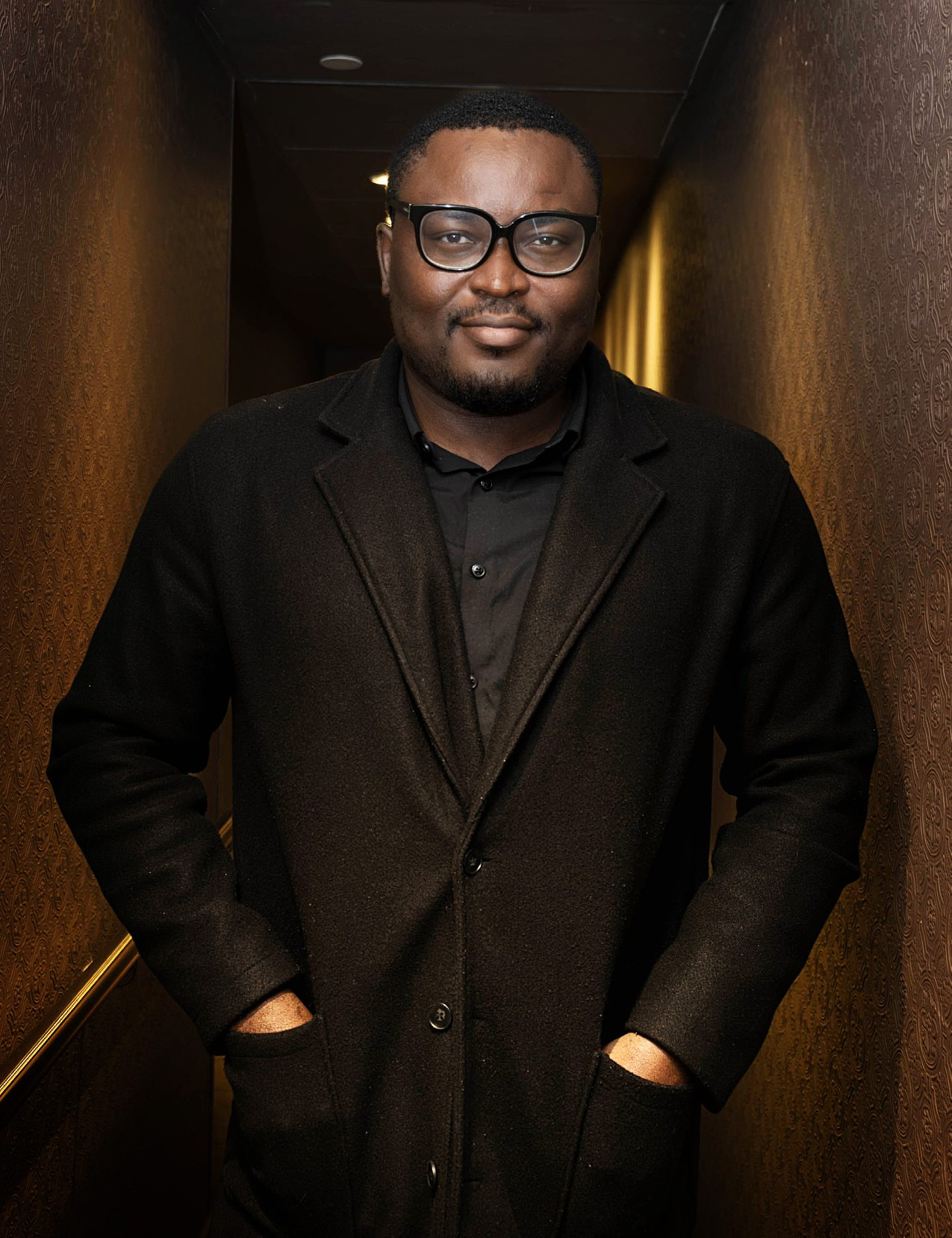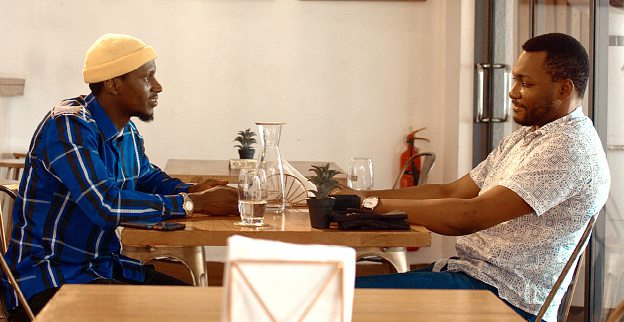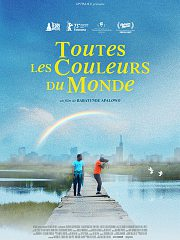Babatunde Apalowo
'Telling about impossible feelings'
An African movie about a love story between two men is rare. Even more so in Nollywood, the center of the Nigerian film industry. 'All the Colours of the World Are Between Black and White', which won an award at the 2023 Berlinale, was shot in Lagos, the other major character in this story.

In May 2014, the Nigerian parliament unanimously passed its Same Sex Marriage (Prohibition) Act, which carries a 14-year prison sentence for same-sex marriages and a 10-year prison sentence for same-sex couples who publicly display their relationship. The choice of subject for Babatunde Apalowo's first feature film is a bold one. After 'A Place of Happiness' (2017), a short film about a man's indecision between two women that won awards at numerous festivals, he turned his attention to the life of a single man who refuses his neighbour's advances and unwillingly falls in love with a man... A scenario that evolved when the 37 year old director became aware of the rampant homophobia in his country. It was also a film that could only be shot in extremis when an actor was finally found for the lead role: Tope Tedela, who made a name for himself in the Nigerian series Blood Sisters on Netflix two years ago [see AM 430]. This was an opportunity for the filmmaker to discuss the basis of discrimination against homosexuals in Africa, as well as the conditions under which the film was shot on the streets of one of the world's largest megalopolises...
AM: Lagos, with its population of 20 million, is the focal point of your film. You depict a quiet megalopolis: is this a fantasy, or a way of combating clichés?
Babatunde Apalowo: It's different for everyone. Most people have a one-sided vision. My Lagos is quiet and chaotic at the same time. I wanted to show a bit of my Lagos.
Do you still live there?
I didn't grow up in Lagos, but in a small town in south-west Nigeria, where there were no cinemas there still aren't any. I moved to Lagos after graduating from university. I remember the feeling I got when I arrived, probably the same feeling people get when they arrive in any other big city. For me, it was Lagos. I was blown away, surprised by its size and energy. I left Lagos a year after filming and now live in Europe, but I return to Nigeria regularly.
This is not your typical Nollywood movie. It has a more artistic aesthetic and deals with a difficult subject in Africa: homosexuality. What made you want to tell this story?

Initially, it was intended as a tribute to Lagos. It was supposed to be the story of a photographer who travels around the city to record its memory. Then something happened: I reconnected with a friend from university. We'd lived in the same public hostel, where I'd befriended my roommate. My friend told me that this boy had since been lynched because he was gay. I didn't know he was gay, and I felt guilty: he hadn't trusted me enough to confide in me. Of course, I was aware of this discrimination in Nigeria, through television and through friends, but until then it had never touched me on a personal level. Now I see people harassing someone in the street because they're dressed a certain way... I went to see another friend who had just beaten someone up, and I asked him why he'd attacked him. He said, "Because he's gay." That was enough justification for him, and on top of that I was expected to understand him. It wasn't satisfactory... And that prompted me to change the script. I felt that this was the story that had to be told, because nobody was going to tell it, even though it's a widespread occurrence in Lagos.
Did you have any references to gay films? Sub-Saharan African films on this theme are rather rare...
No. One very important thing for me was to try not to tell a story about homosexuals. Because I'm not qualified for that. I wanted to relate a love story between two people who can't be together. What helps me to deal with a subject is to have been in the situation of the characters. I've loved someone who didn't love me back, and I'm sure someone has loved me even though I didn't love them back. I didn't try to get references from gay African friends.
You show the attraction that one man feels for another. There is a lot of modesty in the images. Did you think about how to show a budding homosexual relationship in the homophobic context on the continent?
People think that it's because of homophobia in Africa that the film doesn't show any physical relations. But I decided very early on that I was going to concentrate on the emotional journey, on feelings. Because in Nigeria, when people talk about gay love, they mostly talk about sex, sex, sex. Reducing this love to sex is a way of dehumanising it. Sex is part of love, but it's often shown in an invasive way. I chose to show that you can be in love without it being very sexual.
How did you find your actors? Did they readily agree to play these two characters?
It's one of the most difficult things I've ever done, and one of the hardest periods of my life, because at one point I thought the film wasn't going to get made. My producer and I spoke to almost every actor in Nollywood! They all refused, saying: "I have other projects. It was strange. No one said, "I'm not taking this role because it's inappropriate." It was usually, "I really like the script, but I don't think it's right for me." Eventually, it became urgent, and we chose a TV actor, with whom we had done readings: it all clicked. But two weeks before shooting, he cancelled... In the end, it was a friend of the producer's, the actor Tope Tedela, who agreed, and that broke the deadlock. I had to change the dynamic of the story, because Bambino was younger to begin with. I spent three months talking to Tope, and we had to see how the relationship with Riyo David, who played Bawa, was going to develop.
How did you manage to shoot in the streets of Lagos?
Shooting any kind of film is difficult. In Lagos, even more so. And on the streets of Lagos, almost impossible! We had to be cunning... We applied for permits for some locations, but because of the bureaucracy and the time, we had to shoot in guerrilla mode! We changed cars, we moved very quickly, we talked to people... We never knew ahead of time how things were going to work out. We got permission for some places, like the Lekki Conservation Garden, but we often just ran around and filmed as we went along!
Why do you think there’s so much homophobia in Africa?
I think it's the influence of culture and religion. Yet homosexuality has been documented in Africa for as long as anyone can remember. It's really since the early 2000s that there has been growing homophobia in Africa, linked to attempts to break away from Western influences. However, this is largely due to religion: morality is defined by the Bible and the Koran. And it's also due to economic problems: when you're desperate, you act against what you don't understand. For a long time, homosexuality was rejected, but nothing was done about it, and then suddenly, over the past 10 years, laws have been passed in many countries specifically targeting homosexuals. It's also a way for some political leaders to divert attention: it's easier to divide people. African leaders are masters at this, and if they can do it through sexuality they do it.
Your film has won numerous awards since the Berlinale, and even at a major Nigerian festival: AFRIFF. What was the reaction from audiences in Lagos?
Fantastic! The film premiered in Berlin in February 2023. We travelled for almost 10 months, then returned home in November. The reaction was surprising, because we hadn't had much press in Nigeria, but people wanted to see the film. We had problems with the AFRIFF organisers, who kept postponing the dates and times of the screening. Finally, the film was shown on the biggest screen in Lagos. The room was packed. It was the best audience response I'd had all year, because the film is fundamentally Nigerian. A lot of nuances, which went unnoticed elsewhere, were seen here. Nigerians reacted, shouted and applauded during the screening. It was interactive and unexpected.
The film is being released in cinemas and via streaming in France. Where can we see it in Africa?
We're still working on it. We've had a few conversations with broadcasters, and we're trying to see how it fits into the African market. We're optimistic; it just takes a little time. But we're in Africa and we're talking about homosexuality, so anything can happen.
Are you working on a new love story?
I'm going back to Nigeria to shoot. It's also a film about love, this time about a marriage that collapses after the couple's child is diagnosed with a fatal illness. It talks about the socio-political problems we face in Nigeria, in particular the way society treats girl children...
|
Gay love story in Lagos 
Bambino, a motorbike delivery guy on the streets of Lagos, is a lonely bachelor at an age when most people are married with children. Ifeyinwa, a neighbour, makes passes at him, but he doesn't seem to be interested. One day, he meets Bawa, a photographer, and he starts to develop feelings that he must fight... This debut film, which deals with a particularly sensitive subject in Africa, meets two challenges: it tells the story of two men falling in love in a discreet way, and it is shot in a style far removed from the over-the-top effects of Nollywood. The production values are pared down: the frames are fixed, Bambino is often silent, secondary characters' faces are never seen... Quite a challenge in a teeming megalopolis of 20 million people, which is actually the film's ‘main character’! Focusing on the three main protagonists means that we can concentrate on their emotions and their development, in a graphic style and at a steady pace. And, in the background, we are witness to a society's homophobia... The film also has no hesitation, in this very masculine encounter, in sending out a subtle message in favour of women's emancipation. |